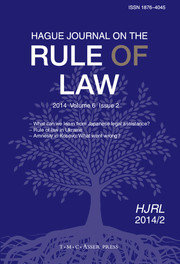Article contents
Indonesian Legal Scholarship and Jurisprudence as an Obstacle for Transplanting Legal Institutions
Published online by Cambridge University Press: 10 October 2013
Abstract
Theory on legal transplants makes a distinction between reception in law and reception in society. Both topics generate their own debates: the former are concerned with the question how the deeper lying legal epistemological structures shape the way in which transplanted rules and institutions acquire new meaning, the latter with how such rules work out on the social processes they ought to regulate. Usually the cases chosen for looking at the legal side are from well-developed legal systems, whereas those about developing countries focus on the social effectiveness. This ignores that many such systems in the world — including in Asia — are fragmented, unevenly developed, and unlikely to be capable of effectively appropriating and reconstructing new rules. The present article takes Indonesia as an example to show how structural problems of legal systems in countries adopting legal transplants may prevent legal rules and institutions from being accommodated into them. The article argues that this resistance can be explained only in part from factors such as governmental fragmentation, corruption, malfunctioning of the political system, or a legal plural colonial heritage, and that they are inherent in the state of legal scholarship and jurisprudence. In Indonesia these are incapable of producing the coherent legal theories required for effective reception of foreign law and legal institutions, a situation likely to be found in many countries. Given the structural factors underpinning this state of legal scholarship and jurisprudence, change will be very difficult to effect and the rule of law is an ideal that remains far away.
- Type
- Articles
- Information
- Copyright
- Copyright © T.M.C. Asser Press and the Authors 2013
- 14
- Cited by


